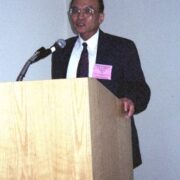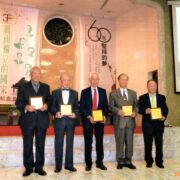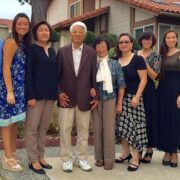臺美人的榮耀(Pride of Taiwanese American) : 11 魏明光先生奮鬥史
作者 李彦輝
2011年1月8日至10日,由「中餐通訊」主辦之第七屆中餐百佳頒獎典禮在三藩市Hyatt Regency 機場飯店隆重舉行,冠蓋雲集,名廚甄文達,烹飪節目主持人林慧懿等中餐界名人也與會。1月10日,本屆百家評選活動之各項大獎現場揭曉,陽明軒憑藉卓越之表現(根據菜肴、服務、裝潢、衛生及品質)奪得“百佳全優名店”第一名,前十名依次為陽明軒(Yang Ming Restaurant,Bryn Mawr,PA),Yank Sing(San Francisco,CA),Ming’s Chinese Restaurant(Pleasant Hill,CA),朵頤食府(Szchuan Gourmet,Flushing,NY),Concerto Fusion Cuisine(Morrisville,PA),四川飯店(Szechuan Chinese Restaurant,Abilene,TX),Lin’s Asian Cuisine(Miramar Beach,FL),紅塔山野生菌食坊(Spring World,Chicago,IL),“稀飯”之家(Congee Village,New York,NY)及金門(Golden Gate Restaurant,Waukesha,WI)。同時也選舉出江孫芸(福祿壽餐館創始人),甄文達(烹飪大師),林慧懿(美食專欄食評),吳永東(食雕藝術大師),詹煌君(烹飪大師),張健(Art Chef Inc.創始人),魏明光(陽明軒東主),胡曉軍(美食集團總裁),Michael Tong(Shun Lee West & Shun Lee Palace 東主) 及朱鎮中(喜福居東主) 等十二位為美國中餐業最具影響力人物。其中陽明軒東主乃新竹寶山客家人─魏明光先生,能在全美四萬六、七千多家中餐館中,脫穎而出,誠乃臺美人之光。2月5日筆者應邀參加該餐館之尾牙宴,乃有機會,利用空檔時間訪問了他。
魏明光先生(Mr. Michael Wei),新竹寶山客家人士,父為魏阿成先生(生前任職警界),母為林錢妹女士,家中六兄弟中排行第四,步三哥魏武雄教授(新竹師範畢業,臺大經濟系學士,美國威斯康辛大學統計學博士,前天普大學統計系主任教授)之後塵進入新竹師範後攻讀新聞於政大-系狀元、班長、系報總編輯於1969年畢業,前教育部長、臺灣政治大學校長-鄭瑞城乃他同班同學。1970年到達美國進入最著名之美國蘇里大學新聞研究院攻讀傳播學。為了籌措學雜費,除在附近餐館打工外,暑假更東來華府於李大為(David Lee)所開聞名中外之「皇后」(Empress)工作(尼克遜總統及季辛吉國務卿常來光顧),目睹「皇后」之生意興隆,能獲得中外人士喜愛,其來有自,因此頗有領會,並從中學到經營心得,而躍躍欲試。在美國蘇里大學1972年學成後,在華府律師事務所工作且兼差附近「皇后」於晚間及週末。
1997年在費城天普大學任教之三哥魏教授告知費城近郊ElkinsPark,有一餐館出售,他也覺得正式開展創業的時候,因此辭去華府律師事務所之工作,攜眷前來費城,將之買下,改建成一家中餐館名為明園(Ming Garden),後又於1984年於費城東北部另開愉園(Szechuan East)。年來經營餐館頗有心得及創見,乃又於1985年創辦天香(Mandarin Garden)於Willow Grove深得顧客青睞及宣揚。成功主要在於不用味素,而用中外天然新鮮精緻調味料,也不用多脂肪醬油。
1990年魏明光先生百尺竿頭更進一步,勇於接受挑戰,將正沒落其位於Bryn Mawr市具歷史悠久且頗有名氣的餐館(Conestoga Inn) 買下,轉成東西方結合之壯麗中餐館,改名為陽明軒(Yangming Restaurant)也就是此次全美中餐館比賽中得冠者。該餐館原為一小樓房,建於美國宣告獨立前,位於兩條繁忙街道交叉口,過去掛過酒店、郵局、商店及西餐館之牌子。兩百年前鐵路乃為最重要交通工具,骨幹Main Line之附近也移來許多富有家庭。Bryn Mawr乃要站之一,此區以猶太人為多數,不少政經名流有錢有勢且喜愛中餐。魏明光先生具獨到眼光乃於1990借款買下,他自己重新設計內外,擔設計家又任建築師,歐洲風格富麗堂皇,燈光明亮。他還創新菜式,將中餐館那些換料不換汁、肉絲混炒蔬菜之食譜剔除,為了迎合東西方人口味,他進一步將傳統之中菜和西方香料互相融和,再取一悅耳動心之菜名。陽明軒非粵菜、川菜、上海菜、臺灣菜、客家菜,而是中、西大廚精心搭配獨具一格之菜譜有別開生面之蔥油餅、生菜包松子雞丁、grilled filet ignon/angel hair pasta & shrimp/jumbo lump crabcakes/grilled Scottish salmon/grilled Asian spice-rubbed rack of lamb,lobster with saffron and Thai herbs 等,中西合璧之菜色。二樓乃大型宴會廳,樓下有酒吧及三間餐廳,可容納250人。服務員英文也不差,待客周到,有禮使顧客有賓至如歸之感。停車場寬敞,方便進出,提供免費服務。
陽明軒之誕生,立及成為費城一大盛事,媒體爭相報導,每天客源絡繹不絕。魏光明先生不以此為滿足,1997年又在賓州費城西北區(Chestnut Hill)櫻丘市開了家法國風味之中餐館,命名「陽春小館」(Cin Cin) 。2004年更斥巨資請來David Rockwell 設計獨具特色之Chef-Patrick Feury,設計有樓高19英尺有如畫廊的正廳,懸掛有一幅大坐佛絲綢畫及大隔間之丹露軒(Nectar)於Berwyn.PA。
由於他經營得法,且很有創新。陽明軒除獲全美中餐館綜合類第一名外,還得過The Keystone Award(賓州餐館同業協會)、America’s Top Tables(美食雜誌)、Ten Great Chinese Restaurants(今日美國報),他本人也在此次舊金山大會獲選為美國中餐業最具影響力十二大人物之一,他也接受美國CBS電視公司之專訪,Ch.29,Ch.3 也來採訪報導。
筆者認為魏明光先生經營中餐業之所以能成功,乃因中西兼顧(聘用東西方大廚),使用西方香料煮中菜,歐式裝潢燈光明亮,白人任經理,顧客至上,賓客得盡歡而歸等。
除此之外,魏明光先生服務社會亦不遺餘力,樂善好施,如:2005年8月臺灣屏東客家樂舞團應本人之邀來美公演 (其中包括本人填詞,由黃友棣譜曲之[美國,我的新家鄉] 及改作[海外客家本色]等客家歌曲)。在8月14日下午 於賓,西凡尼亞州費城西南郊之羅詩蒙學院(Rosemont College,Rosemont,PA) 表演中心演藝廳演出後,大家到陽明軒晚餐慶功聯歡。魏明光先生即捐出餐款所得,另加美金一千贊助屏東客家樂舞團。此外,魏光明先生對客家文化活動亦非常投入與熱心公益。
-11-魏明光先生奮鬥史2.png)
魏明光先生在陽明軒致歡迎辭 2005-8-14
-11-魏明光先生奮鬥史3.png) 魏明光先生持銀盾(左)與筆者合影 2011-2-5
魏明光先生持銀盾(左)與筆者合影 2011-2-5
-11-魏明光先生奮鬥史4.png) 所得12大影響力名人獎狀
所得12大影響力名人獎狀
撰稿人:李彥輝 先生
‘Pride of the Taiwanese American’ – Mr. Michael Wei’s Story of Struggle: Franklin Lee From January 8 to 10, 2011, ‘Chinese Restaurant News’ held their seventh annual Top 100 Chinese Restaurants Competition at the San Francisco Hyatt Regency Airport Hotel. The grand affair saw the gathering of many prestigious and famous guests, including renowned chef Martin Yan (甄文達) cooking show host Teresa Lin (林慧懿) and other big names from the world of Chinese cooking. On January 10, the 100 winners in each category of this year’s competition were announced.
For their exceptional performance (as regards dishes, service, decor, hygiene and quality), Yang Ming Restaurant took first place in the Top 100 category for Overall Excellence. The top ten were as follows: The Yang Ming Restaurant, Bryn Mawr, PA; Yank Sing, San Francisco, CA; Ming’s Chinese Restaurant, Pleasant Hill, CA; Szchuan Gourmet, Flushing, NY; Concerto Fusion Cuisine, Morrisville, PA; The Szechuan Chinese Restaurant, Abilene, TX; Lin’s Asian Cuisine, Miramar Beach, FL; Spring World, Chicago, IL; Congee Village, New York, NY; and The Golden Gate Restaurant, Waukesha, WI. At the same time, Cecilia Chiang (founder of Mandarin Restaurant), Martin Yan (master chef), Theresa Lin (gourmet review columnist), Tony Wu (food carving master), Hwang June
Jan (master chef), Jimmy Zhang (Founder of Art Chef Inc.), Michael M. Wei (owner of Yang Ming Restaurant), Tony Hu (president of Tony Gourmet Group), Michael Tong (Owner and Executive Chef of Shun Lee West And Shun Lee Palace), Lawrence C. C. Chu (Owner of Chef Chu’s Restaurant), and so on, were named as the 12 most influential personalities in the American Chinese restaurant industry.
Michael Wei, owner of Yang Ming Restaurant and a Hakka from Baoshan in Hsinchu, Taiwan, was able to stand out among 46,000-47,000 restaurants across America and bring glory to the Hakka of Taiwan. On February 5 noted restaurant magazine author accepted an invitation to attend the closing banquet and had occasion to interview him.
Mr. Michael Wei, Hakka and native of Baoshan, Hsinchu; father, Mr. Wei Ah-Cheng (formerly served in the police force); mother, Ms. Lin Chian-mei. Fourth among six boys, he followed the footsteps of his brother, Professor Wei Wu-hsiung (graduated from Provincial Hsinchu Teacher School ; B.A. in Economics, National Taiwan University; PhD in statistics, University of Wisconsin; professor and former chair at the Dept. of Statistics, Temple University), and after attending Provincial Hsinchu Teacher School he studied Journalism at National Chengchi University. There, he was No.1 to pass the entrance examination and chief editor of the departmental newspaper, and graduated first in his class of 1969 . (Former Minister of Education and President of National Chengchi University, Cheng Jei-cheng was his classmate.)
He arrived in the United States in 1970 and entered the
University of Missouri School of Journalism to study broadcasting. In order to earn money for tuition and other expenses, he took part time work at a local restaurant. During summers he went to WashingtonD.C. to work at David Lee’s famous ‘Empress’ restaurant.( President Nixon and Secretary of State Henry Kissinger often patronized the establishment), and he saw that the Empress’s business was thriving and could garner the admiration of non-Chinese people. Having gained a fair understanding and learning about the operation of a restaurant, he was eager to try for himself. After graduating from the University of Missouri in 1972, he worked at a law firm in Washington, continuing to work part time at the Empress on evenings and weekends.
In 1977, his brother, professor Wei at Temple University in Philadelphia, told him of a restaurant for sale in Elkins Park—a Philadelphia suburb. He had been considering formally starting just such an endeavor, and thereupon resigned from the law firm, moved to Philadelphia, bought the property, and turned it into a Chinese restaurant called the Ming Garden.Later, in 1984, he opened another establishment—the Szechuan East—in northern Philadelphia. Having gained experience and inspiration from years of being a restaurateur, he again opened a new restaurant—the Mandarin Garden—in 1985, earning considerable favor and word of mouth from his clients. His success came largely from eschewing MSG, relying instead on natural flavorings from the West, and making sparing use of grease and soy sauce.
Not satisfied with his success, in 1990 Mr. Wei took his efforts to even greater heights, bravely taking on a new challenge. He bought the long-standing since Independence War and quite well-known Conestoga Inn in Bryn Mawr, PA, which was in decline. He turned it into an Eastern fusion restaurant, changing the name to the Yang Ming Restaurant. It was this concept that would later earn the title of best Chinese restaurant in America. The restaurant was originally a small, pre-independence building located at the corner of two busy streets, which in the past had served as a bar, a post office, a store and a Western restaurant. Two hundred years ago the railroad was still the most important means of transportation, and many rich families moved near the Main Line. Bryn Mawr was an important station, and the majority of residents are Jewish – political and financial elites with wealth and influence who love to eat Chinese food.
With a keen eye, Mr. Wei borrowed money to purchase the building in 1990 and personally redesigned the interior, once serving as designer and architect. The European style is magnificent, bright and open. He also created new dishes, removing the monotonous stir-fry recipes typical of Chinese restaurants. In order to appeal to the palates of Western and Easter clients alike, he made advances in the fusion of traditional ingredients from the East and West, while choosing new, enticing names for the dishes.
The Yang Ming cannot be described as Cantonese, Szechuan, Shanghainese, Taiwanese or Hakka, but rather serves unique combinations meticulously selected by master Eastern and Western chefs, breaking new ground with cong you bing (a savory, fried flat pastry green onion), shengcai bao (a steamed dumpling with a thick, bread-like skin) with pine nuts and chicken cubes, grilled filet mignon, angel hair pasta with shrimp, jumbo lump crab cakes, grilled Scottish salmon, grilled Asian spice-rubbed rack of lamb, lobster with saffron and Thai herbs, and more—a splendor of East-meets-West. On the second floor is a large banquet hall; a bar and third dining hall occupy the basement, in total providing seating for 250 people. The staff also speak good English, the service is considerate and polite, making guests feel at home. A large parking lot is provided for the convenience of guests at no charge.
The Yang Ming was an immediate success, with media outlets vying for reporting time and a continuous stream of customers. Mr. Wei, however, was not so easily satisfied. In 1997 he opened a French-style Chinese restaurant in the Chestnut Hill district of northeast Philadelphia, called Cin Cin. In 2004 he expanded massively, bringing in designer David Rockwell and specialty chef Patrick Feury to create a 19 yard high, gallery-like dining space with an enormous silk painting of a seated Buddha and towering partitions, called Nectar, in Berwyn, PA.
Owing to his knack for running a business and creativity, beyond winning Best Overall Chinese restaurant in America, the Yang Ming has earned recognition from the Keystone Award (Pennsylvania Restaurant Association), America’s Top Tables and Ten Great Chinese Restaurants (USA Today). He was also named one of the twelve most influential people in the American Chinese restaurant industry at the award ceremony in San Francisco and was interviewed by CBS as well as Channel 29 and Channel 3.
This author believes Mr. Michael Wei’s business success can be attributed to the combination of Chinese and Western styles (and hiring Eastern and Western master chefs). Using Western seasonings to prepare Chinese dishes, served in a bright, spacious European setting, using a Western management style where the customer comes first, people just keep coming back.
Furthermore, Mr. Wei’s efforts at giving back to the community are not insignificant, and he takes much pleasure it in. For example, in August, 2005, the Pingtung Hakka Dance Troupe came, at the invitation of this author, to perform in America (including this author’s own lyrics, performing Huang Yau-tai’s ‘America, My New Homeytown’ (美國,我的新家鄉), and ‘Spirit of Overseas Hakka’ (海外客家本色), among other Hakka songs). After the performance on the afternoon of August 14 at the Performing Arts Center at Rosemont College in Rosemont, PA, everyone went to the Yang Ming Restaurant to celebrate. Mr. Wei donated the entire proceeds from the meal, along with an additional $1000, to the Pingtung Hakka Dance Troupe. In addition, Mr. Wei is very enthusiastic and committed with respect to Hakka cultural events.
Pingtung Hakka Dance Group Performance, 2005/08/14
Mr. Michael Wei welcoming guests at the Yang Ming Restaurant, 2005-08-14
Photo of Mr. Michael Wei (left) holding silver plaque together with this author, 2011-02-05
Certificate for the Twelve Most Influential Personalities in [the] American Chinese Restaurant Industry
源自李彥輝





